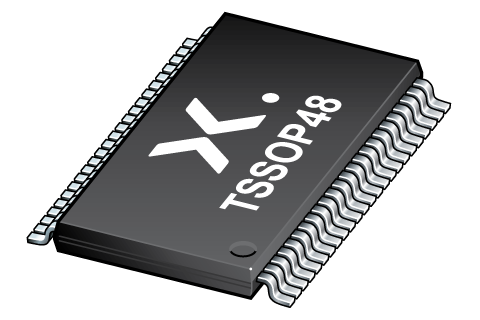可订购部件
| 型号 | 可订购的器件编号 | 订购代码(12NC) | 封装 | 从经销商处购买 |
|---|---|---|---|---|
| 74ALVCH16373DGG | 74ALVCH16373DGG:11 | 935205120118 | SOT362-1 | 订单产品 |

Register once, drag and drop ECAD models into your CAD tool and speed up your design.
Click here for more information2.5 V/3.3 V 16-bit D-type transparent latch; 3-state
The 74ALVCH16373 is a 16-bit D-type transparent latch with bus hold inputs and 3-state outputs. The device can be used as two 8-bit transparent latches or a single 16-bit transparent latch. The device features two latch enables (1LE and 2LE) and two output enables (1OE and 2OE), each controlling 8-bits. When nLE is HIGH, data at the inputs enter the latches. In this condition the latches are transparent, a latch output will change each time its corresponding D-input changes. When nLE is LOW the latches store the information that was present at the inputs a set-up time preceding the HIGH-to-LOW transition of nLE. A HIGH on nOE causes the outputs to assume a high-impedance OFF-state. Operation of the nOE input does not affect the state of the latches.
This device is fully specified for partial power down applications using IOFF. The IOFF circuitry disables the output, preventing the potentially damaging backflow current through the device when it is powered down.
Wide supply voltage range from 1.2 V to 3.6 V
CMOS low power dissipation
MULTIBYTE™ flow-through standard pin-out architecture
Low inductance multiple VCC and GND pins for minimum noise and ground bounce
Direct interface with TTL levels
All data inputs have bus hold
Latch-up performance exceeds 100 mA per JESD78 Class II.A
Output drive capability 50 Ω transmission lines at 85 °C
Current drive ±24 mA at VCC = 3.0 V
JESD8-7 (1.65 V to 1.95 V)
JESD8-5 (2.3 V to 2.7 V)
JESD8C/JESD36 (2.7 V to 3.6 V)
ESD protection:
| 型号 | VCC (V) | Logic switching levels | Output drive capability (mA) | tpd (ns) | Power dissipation considerations | Tamb (°C) | Rth(j-a) (K/W) | Ψth(j-top) (K/W) | Rth(j-c) (K/W) | Package name |
|---|---|---|---|---|---|---|---|---|---|---|
| 74ALVCH16373DGG | 2.3 - 3.6 | LVTTL | ± 24 | 2.1 | low | -40~85 | 82 | 1.8 | 35 | TSSOP48 |
| Model Name | 描述 |
|---|---|
|
|
| 型号 | 可订购的器件编号,(订购码(12NC)) | 状态 | 标示 | 封装 | 外形图 | 回流焊/波峰焊 | 包装 |
|---|---|---|---|---|---|---|---|
| 74ALVCH16373DGG | 74ALVCH16373DGG:11 (935205120118) |
Active | ALVCH16373 |

TSSOP48 (SOT362-1) |
SOT362-1 |
SSOP-TSSOP-VSO-WAVE
|
SOT362-1_118 |
| 文件名称 | 标题 | 类型 | 日期 |
|---|---|---|---|
| 74ALVCH16373 | 2.5 V/3.3 V 16-bit D-type transparent latch; 3-state | Data sheet | 2024-06-18 |
| SOT362-1 | 3D model for products with SOT362-1 package | Design support | 2020-01-22 |
| alvch16373 | alvch16373 IBIS model | IBIS model | 2013-04-08 |
| Nexperia_package_poster | Nexperia package poster | Leaflet | 2020-05-15 |
| TSSOP48_SOT362-1_mk | plastic, thin shrink small outline package; 48 leads; 0.5 mm pitch; 12.8 mm x 6.1 mm x 1.2 mm body | Marcom graphics | 2017-01-28 |
| SOT362-1 | plastic thin shrink small outline package; 48 leads; body width 6.1 mm | Package information | 2024-01-05 |
| SOT362-1_118 | TSSOP48; Reel pack for SMD, 13''; Q1/T1 product orientation | Packing information | 2020-04-21 |
| 74ALVCH16373DGG_Nexperia_Product_Reliability | 74ALVCH16373DGG Nexperia Product Reliability | Quality document | 2025-03-20 |
| SSOP-TSSOP-VSO-WAVE | Footprint for wave soldering | Wave soldering | 2009-10-08 |
The Nexperia Longevity Program is aimed to provide our customers information from time to time about the expected time that our products can be ordered. The NLP is reviewed and updated regularly by our Executive Management Team. View our longevity program here.
| 文件名称 | 标题 | 类型 | 日期 |
|---|---|---|---|
| alvch16373 | alvch16373 IBIS model | IBIS model | 2013-04-08 |
| SOT362-1 | 3D model for products with SOT362-1 package | Design support | 2020-01-22 |
| Model Name | 描述 |
|---|---|
|
|
| 型号 | Orderable part number | Ordering code (12NC) | 状态 | 包装 | Packing Quantity | 在线购买 |
|---|---|---|---|---|---|---|
| 74ALVCH16373DGG | 74ALVCH16373DGG:11 | 935205120118 | Active | SOT362-1_118 | 2,000 | 订单产品 |
作为 Nexperia 的客户,您可以通过我们的销售机构订购样品。
如果您没有 Nexperia 的直接账户,我们的全球和地区分销商网络可为您提供 Nexperia 样品支持。查看官方经销商列表。
The interactive datasheets are based on the Nexperia MOSFET precision electrothermal models. With our interactive datasheets you can simply specify your own conditions interactively. Start by changing the values of the conditions. You can do this by using the sliders in the condition fields. By dragging the sliders you will see how the MOSFET will perform at the new conditions set.